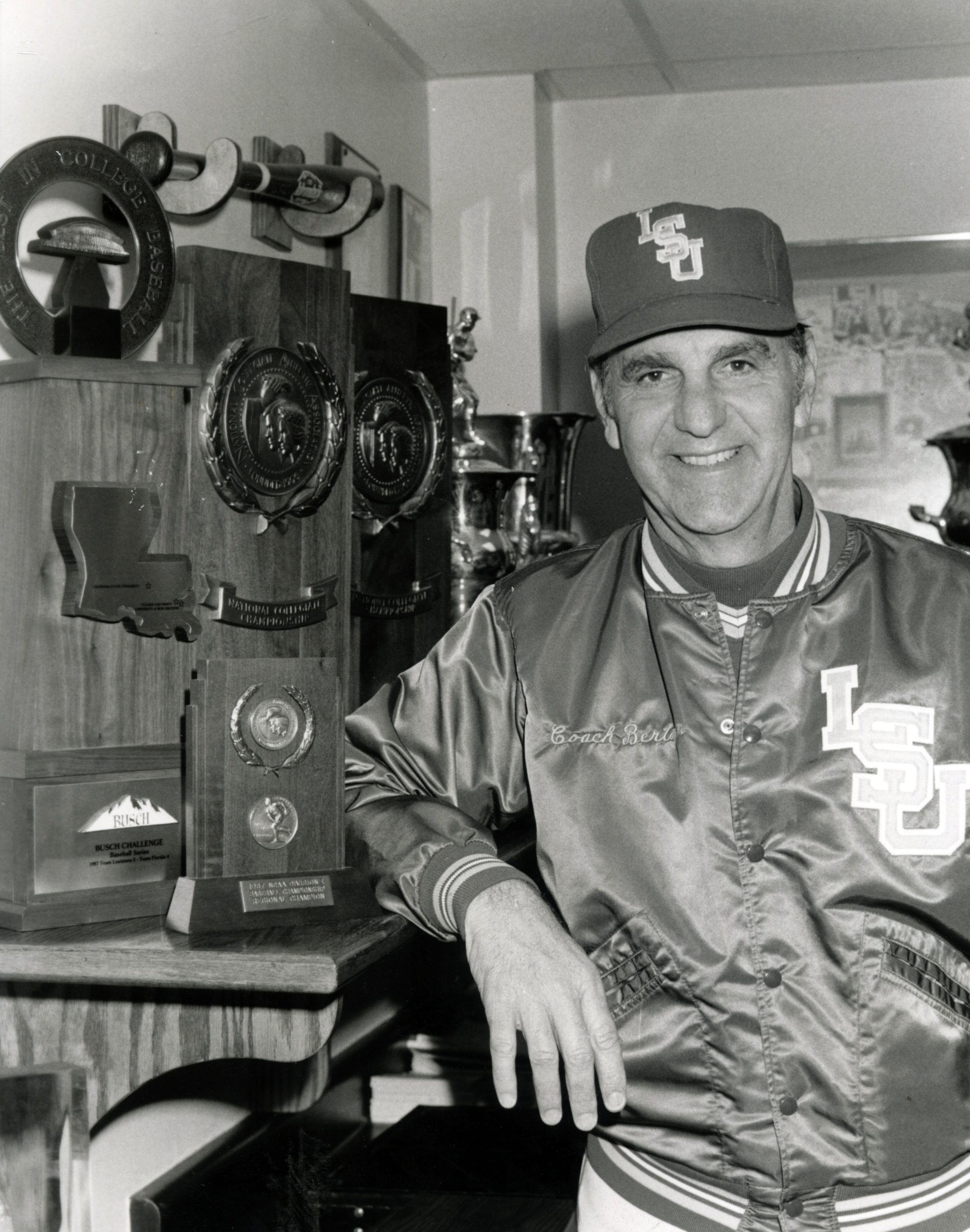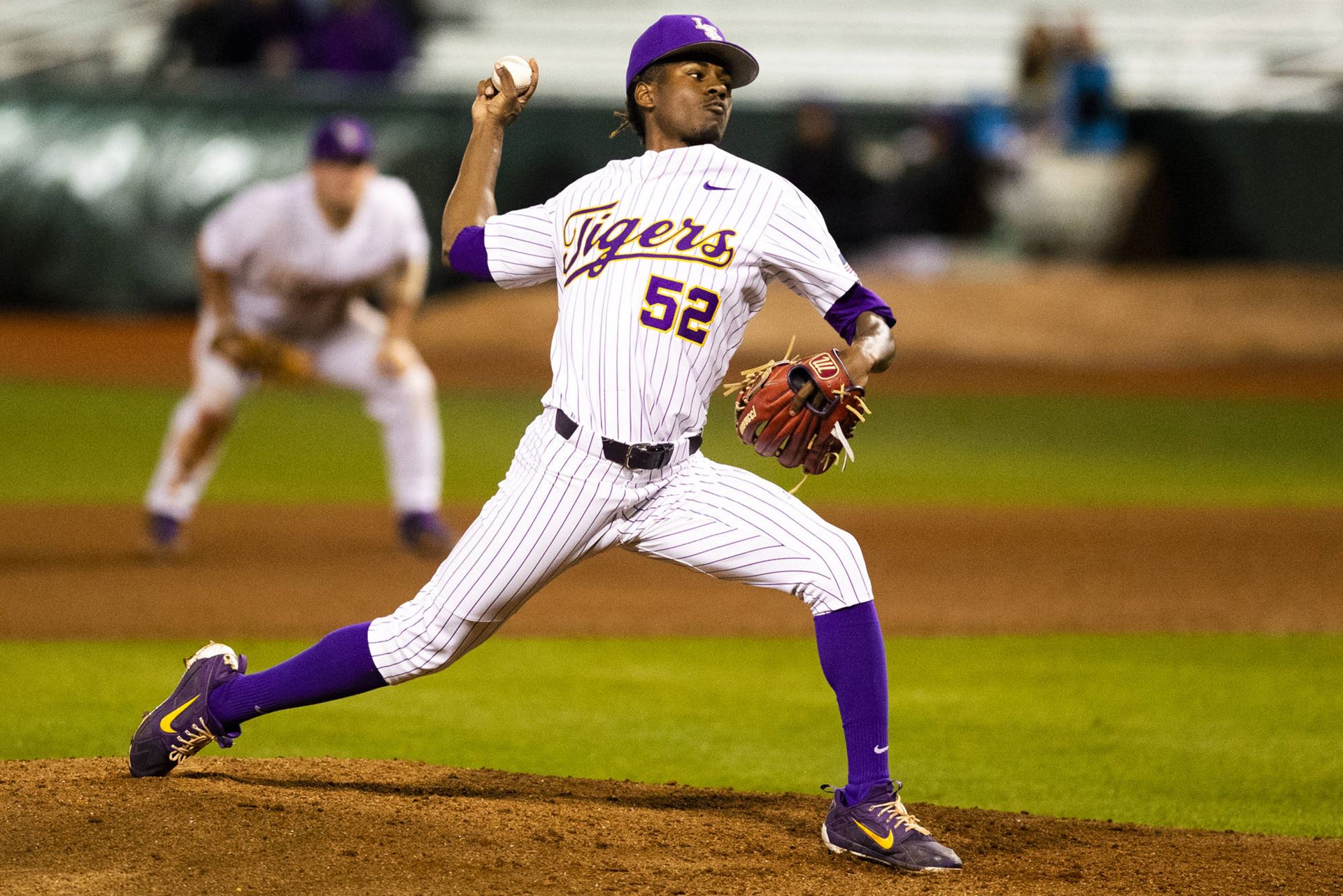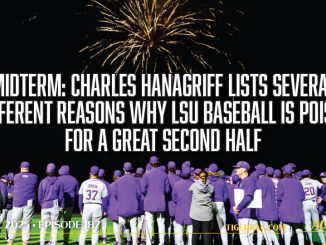
Welcome to the 16th category of our Tiger Rag High Five, the best men’s all-time men’s sports head coach.
A 15-member media panel with a collective 582 years of sports journalism experience picked LSU’s five best athletes, coaches, moments, and individual game and season performances in 21 categories covering all present and past sports.
Voters on the panel were provided information of six to 10 nominees and were asked to rank one through five. The panel voters could also write-in their own candidates.
Scoring was tallied as 5 points for a first-place vote, 4 for second-place, 3 for third-place, 2 for second place and 1 for last-place. Ties were not broken.
The winner of the best-ever LSU men’s sports head coach is. . .
Skip Bertman, baseball 72 (12 first-place votes)
2. Nick Saban, football 49 (1)
Resurrected LSU football, won 2003 national championship, two SEC titles (2001-03)
3. Pat Henry, track and field 30 (1)
Won five NCAA and four SEC team championships in 17 seasons
4. Dale Brown, basketball 27
Took Tigers to 1981-86 Final Fours, won four SEC championships
5. Les Miles, football 13
Won a national title (2007) and two SEC championships (2007, 2011)
Here’s Bertman’s story, a condensed version of the series of stories written by freelancer Jim Mashek that has already appeared on this website:
By Jim Mashek
They stood outside the interview tent quietly talking among themselves.
LSU catcher Rob Leary, shortstop Jeff Reboulet, third baseman Jeff Yurtin and second baseman Burke Broussard were anguishing over the Tigers’ lackluster season-ending loss in the 1985 NCAA Central Regional in Austin, Texas.
Two straight defeats to cut short a 41-14 year in Skip Bertman’s second season as head coach featured a 4-3 losers-go-home loss to Lamar.
“We were (ticked off),” Leary said. “We were all juniors and we knew we were coming back for our senior year. We looked each other in the eye and said, `Nothing like this is ever gonna happen again, not while we’re playing at LSU.’”
Nothing like that ever happened again at LSU, not in Bertman’s 18 seasons leading the Tigers from 1984-2001 after he came to Baton Rouge from the University of Miami as an assistant under the legendary Ron Fraser.
“When (LSU athletic director) Bob Brodhead reached me on the phone, I was pretty comfortable at Miami,” said Bertman, who won the first of his five national titles in 1991 in his eighth LSU season and on his fifth trip to the CWS with the Tigers. “I called my wife, Sandy, and told her I was going to visit LSU and Baton Rouge. I was 44 years old, and Ron Fraser had once been up for the Miami AD job. When he decided to stay in coaching, the LSU job was intriguing.
“Naturally, I made a lot of phone calls to people like (Mississippi State coach) Ron Polk, some coaches in Florida, Georgia. Not everyone was really sure about the LSU job.”
Bertman accepted LSU’s offer anyway, the rest is college baseball history and why the Tiger Rag High 5 selection committee chose Bertman as LSU all-time best men’s sports head coach.
Starting at the bottom
When Bertman arrived at LSU, the Tigers had won just five SEC championships. They also had made just one NCAA tournament appearance in their then-88-year baseball history, which came in 1975 when the late Jim Smith’s Tigers squad won the SEC title.
There hadn’t ever been a true financial commitment to baseball from the LSU administration. For instance, Smith had doubled as the Tigers’ football equipment manager for years, which meant the baseball team had limited fall workouts.
Also, LSU played its home games in Alex Box Stadium, a relic that opened in 1938 which needed a facelift for which there were no funds.
Bertman knew the best way to raise money was to win games and make sure fans had a good experience. He borrowed some promotional ideas from his old boss Fraser, and he hustled to get people in the stands.
“We had to do a lot of promotions, things like that, to get people to ballpark,” Bertman said. “We had the boys give out schedules in their uniforms at basketball games, and we set up the Coaches Committee with people like Richard Lipsey and Wally McMakin, who was on the 1975 LSU team.
“We had to get a diaper-changing table, for the men’s and women’s restrooms. Spruce up the stadium. Things that others might overlook. The saying was, `If Mom doesn’t come to the game, nobody’s coming.”
Bertman implemented a demanding offseason conditioning program, plus a more intense approach to fall baseball. He often had his team meet at Alex Box for a two-mile run before their morning classes. Sometimes, practices in the fall approached three, even four hours.
By his third season in 1986, he had the Tigers headed to their first College World Series in Omaha after winning the SEC with a 22-5 record. LSU won all nine of its league series and started the year winning 36 of its first 40 games.
After the aforementioned two losses and out in the Tigers’ first of 16 NCAA tournament appearances under Bertman in 1985, Bertman had assembled a capable and determined team for its first CWS run that ended going 1-2 in the CWS to finish 55-14.
“We were really competitive, even if we lost,” Bertman said.
A 1987 Omaha re-deaux and lessons learned in a post-season miss
Bertman’s fourth Tigers’ season in ’87 was a year of ups and downs, which included outfielder Albert “Joey” Belle’s histrionics and occasional temper tantrums.
It all came to a head at the SEC tournament at Georgia when some Mississippi State fans taunted Belle with racist slurs. One State fan brandished a long 2×4 while deriding Belle from a hill beyond right field. Belle left the playing field to chase the abusive fan.
When the team returned to Baton Rouge after going 1-2 in the tourney, Bertman decided if Belle wanted to remain with the team, he would have to apologize to his teammates, the fans and the media for his behavior over a long, trying season.
Belle declined. Bertman dismissed him from the team before LSU made the short trip to win an NCAA regional at the University of New Orleans.
In their return to the CWS, the Tigers were 2-2. They were eliminated when 6-7 freshman pitcher Ben McDonald gave up a walk-off grand slam to Stanford’s Paul Carey in a 6-5 win over LSU that ended the Tigers’ season at 49-19.
“It’s weird, sometimes, how setbacks can affect you mentally,” McDonald said. “That grand slam (against Stanford) actually set me forward. . .I never wanted to feel that kind of pain again.”
Bertman brought in some fresh faces for the 1988 season, including junior college standouts, catcher Mike Bianco and outfielder Craig Cala. McDonald and Russ Springer were back to bolster the pitching staff, as McDonald decided to drop also playing basketball and solely concentrate on baseball.
But the 39-21 Tigers failed to earn an NCAA tourney bid.
The hard road through College Station
Bertman recruited some promising pitchers for the ’89 squad, which would go down as one of the most memorable in school history.
“We knew we had big-league pitching coming back for 1989,” junior first baseman Pete Bush said. “Everybody was ready to go the next fall.”
McDonald had become the most celebrated player in college baseball. He had a commanding mound presence, exceptional control and a strong repertoire of pitches.
Pro scouts began following him everywhere. But as it turned out, LSU had six future major league pitchers on the 1989 roster – McDonald, Springer, lefty John O’Donough, freshmen right-handers Paul Byrd and Chad Ogea, and Curtis Leskanic, one of the most colorful players LSU baseball has ever seen.
The Tigers, second in SEC regular season play behind Mississippi State, returned to the NCAA tournament after as one-year absence as a No. 2 seed in a regional at No. 1 seed and 55-5 Texas A&M.
LSU, after a game two loss against South Alabama, fought its way out of the losers’ bracket. The Tigers needed two victories over Aggies in the same day to make their third CWS appearance in four years.
McDonald worked seven strong innings and the LSU bats came alive in a 13-5 victory to force a winner-take-all game.
“Nobody really gave us much of a chance, going in there, to A&M,” McDonald recalled. “There wasn’t quite as much pressure on us, compared to those guys. But we had a bunch of competitors. (Catcher) Mike Bianco, you’d want him in a foxhole with you. We weren’t scared. Our attitude was, `Well, to get to Omaha, we might as well go through the best.’ We had a little swagger to us.”
Staying cool in a sweatbox
The heat at Texas A&M’s Olsen Field pushed 100 degrees. Horseflies buzzed around the press box, and in the dugouts.
But after LSU forced the winner-goes-to-Omaha game, it had 2½ to three hours to kill between games.
“We’d already played five games in four days, in that heat, so we were pretty tired,” Bush said. “Most of the guys just rested. Some of us took little naps.”
McDonald recalled the Texas A&M ticket office didn’t even print tickets for a possible second game. The regional was being billed as a coronation for the Aggies.
The game stayed tight and the drama was building. Bertman brought Leskanic out of the bullpen against the Aggies in the late innings, and he was on top of his game.
Meanwhile, both Bertman and A&M coach Mark Johnson were running out of bench players. When it came to the top of the 11th inning with two outs and a runner on second base, Bertman summoned backup infielder Pat Garrity, a freshman from New Orleans, as a pinch-hitter.
Garrity had 17 at-bats all season, but he would replace third baseman Luis Garcia. Garcia had replaced starting third baseman Phil Espinosa for defensive purposes in the late innings.
“The A&M pitcher left a 2-2 breaking ball up, and it was a good pitch to hit,” said Garrity, who belted an RBI double off the top of the fence in right-center field putting the Tigers in front 5-4. “I was always a pretty good breaking-ball hitter. . .but yeah, I was surprised when Skip told me to grab a bat. I hadn’t had an at bat in six weeks.”
Leskanic recorded the first two outs in the bottom of the 11th and thought he had caught an A&M batter looking at a called third strike on a 3-2 pitch that caught the heart of the plate. The umpire wouldn’t ring him up, however, and Leskanic let out a loud protest, leading to much commotion between umpires and the LSU dugout.
Was Leskanic thrown out of the game?
“I think they were telling Skip to get me out of there,” Leskanic said. ”Officially, I guess it wasn’t an ejection.”
McDonald trotted in from the bullpen. As fate would have it, a high chopper to Garrity hugged the third-base line in fair territory. Garrity fielded it cleanly and made the throw to Bush, his roommate on the road, to send the Tigers to Omaha.
Afterward, the impromptu party at the LSU hotel, the full-service Holiday Inn in College Station, went well past 2 in the morning. Media members and LSU fans were also in attendance.
LSU arrived in Omaha a few days later as a sentimental favorite, a team with flaws but a lot of grit and determination.
While at the CWS, McDonald was named winner of the Golden Spikes award as the national Player of the Year. He was also selected by the Baltimore Orioles as the No.1 overall pick in the MLB draft, the first and still only LSU player ever taken first overall.
LSU dropped a 5-2 decision to Miami in its CWS opener, but the Tigers stayed alive in the losers’ bracket with victories over Long Beach State and then Miami. That put the Tigers into another losers’ bracket showdown with Texas.
Bertman mulled over his pitching options before deciding to go with McDonald, who had developed a painful blister on his pitching hand.
“With Ben’s blister, we really didn’t know what to do,” Bertman said. “Curtis Leskanic was really hot, pitching very well. But if we could win two more games, we’d be in the championship game, and I wanted to have Ben McDonald for that game.”
It didn’t happen, however, as Texas rallied for a 12-7 victory. LSU finished 55-17, tying the ’86 team record for wins in a single season, but Bertman had a strong nucleus intact for the 1990 season.
Fulfilling the mission
The Tigers won another SEC regular-season championship in 1990, shared the tournament title with Mississippi State and then came out of the losers’ bracket hosting an NCAA regional to advance to the CWS.
LSU again reached the CWS semifinal, but Oklahoma State sent the Tigers home with a resounding 14-3 victory at Rosenblatt Stadium.
By 1991, the Tigers were a full-fledged national powerhouse when they returned to the CWS as the No. 4 seed.
“We started eliminating the distractions,” LSU catcher Gary Hymel said. “You get up there, to Omaha, and there’s all these equipment reps with merchandise and giveaways. There’s lots of pro scouts. We got up there, and we basically said, ‘We don’t need this.’
“Skip closed batting practice (to the fans and media) and the environment was a little bit different. It’s like we were kind of on a mission.”
LSU rolled to an 8-1 victory over SEC rival Florida in first-round play, a 15-3 triumph over Fresno State in game 2 and a 19-8 blowout of Florida to advance to the national title game.
Then, playing for its first national championship in school history, LSU stopped Wichita State 6-3, with the Tigers dogpiling near the mound at Rosenblatt Stadium. Hymel, a senior from Baton Rouge, hit four home runs in the tournament and was named the Most Valuable Player.
“Going to LSU was the best decision I ever made,” said Hymel, who reached Triple-A baseball in his seven-year pro career with MLB’s Montreal Expos.
Third baseman Chris Moock, who also grew up near Baton Rouge, said Bertman often reminded the players what LSU began building in 1984.
“When you got to LSU,” Moock said, “one of Skip’s points of emphasis was, ‘You owe a lot to the people who came before you.’”
That sort of continuity, captured by Bertman’s five national championships, is perhaps best explained by longtime LSU manager Russell Rome, a high school catcher at East St. John who earned his engineering degree “on the six- or seven-year plan” while toiling with Tigers baseball.
“Coach Bertman would always like to say, ‘We’re getting a Harvard education in baseball,’” Rome said. “To me, and to a lot of the guys in my time, it was more like a Harvard education in life.”
(Editor’s note: Jim Mashek covered LSU baseball for the Morning Advocate in Baton Rouge from 1985 until 1989 and as a freelancer in 1990)




Be the first to comment